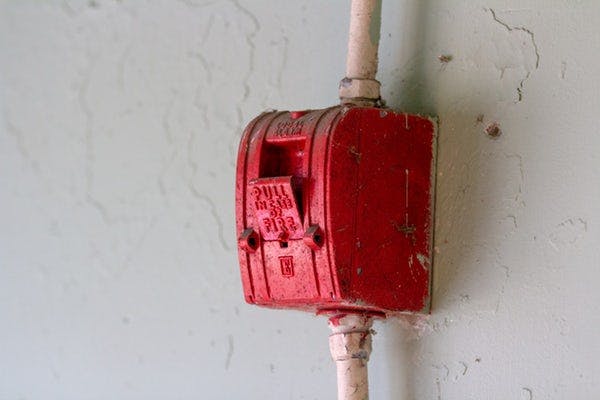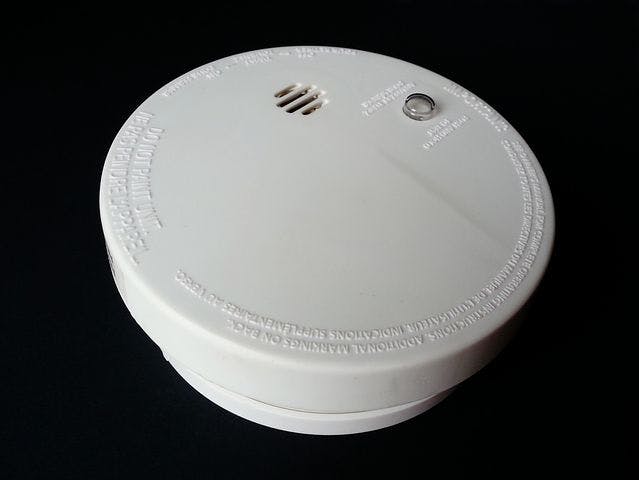Fire Alarm Going Off? What Can Trigger a Smoke Detector and Other Maintenance Tips
We’ve all been there. Middle of the night, sound asleep and then suddenly startled by an incessant, high-pitched chirping sound coming from the smoke detector, just outside of your bedroom.
It’s definitely a less glamorous task of homeownership, but smoke detector maintenance is important because it plays a critical role when it comes to home safety.
According to the Consumer Product Safety Commission, about 2,000 people die in residential fires every year, mainly from inhaling smoke and deadly gases. And it’s these specific fumes that set off smoke detectors.
However, it’s not just smoke and deadly gases that set off a smoke detector. In this article we’ll discuss what exactly sets off a smoke detector, how to stop it, and the proper maintenance of your smoke detectors in order to keep you and your loved ones safe.

What Can Trigger a Smoke Detector? And How Do You Stop It?
Whenever your smoke detector goes off, it’s important that you first make sure there is no fire in your house. Just because you don’t see or smell a fire doesn’t mean that it’s automatically a false fire alarm. It could be a hidden electrical fire.
However, once you determine that there is no fire, the smoke detector could be triggered by other factors. Below are the most common types of triggers and how to stop the false alarm:
- Smoke — It doesn’t have to be a ton of smoke to set off a false alarm, just an odor of something burning can set it off. Smoke can come from any area within your home — from the living room fireplace to the kitchen or patio. To stop the alarm, you’ll need to air out the area — open windows, turn on fans and vents above the stove, and wave the smoke out from the area near the smoke detector. Once the smoke is gone, reset the device.
- Dust/Dirt — Along with smoke, this is another common cause for a false alarm. Photoelectric smoke detectors can mistake dust in or around the device as smoke because dust particles, like smoke particles, can reflect light. This can easily be fixed by cleaning the device and then resetting it.
- Steam — Again, because steam from the shower or cooked food can set off a smoke detector, you shouldn’t install one in or just outside of the bathroom or cooking area. You’ll need to air out the area and reset the device.
- Humidity – The density from the moisture in the air can trigger a false alarm. Just like with steam, be careful in extreme humid conditions (85% or higher) because it can set off a smoke detector. Be sure to air out the surrounding area if you’re experiencing extreme humidity.
- Insects — Yes, those pesky pests could be a reason your smoke detector is chirping. It’s possible that they crawled into the smoke detector and triggered a sensor. You’ll need to remove the smoke detector cover and clean out the device.
- Strong Chemical Fumes – Cleaning agents and paint fumes, especially oil-based paints, can set off a smoke detector. Just like with smoke and steam, you’ll need to air out the area and reset the device.
- Low Battery – With a low battery, your smoke detector should be making a different sound, such as short chirps instead of the regular alarm. Check the device manual before installing new batteries.
And if you’re not experiencing any of the above scenarios, your smoke detector may be malfunctioning or has reached the end of its life cycle. A typical lifespan of a smoke detector is around 10 years and after that, you’ll need to replace it. Consult your device manual or local electrician to determine if it’s a malfunction or if the device is dead.

What If Your Smoke Detector Continues to Go Off?
If the above tips and tricks haven’t solved your smoke alarm woes, you may need to move the smoke detector to another area in your house.
When looking for another area to install your smoke detector, make sure to do it in a climate controlled area and near the bedrooms of the house. Additionally, you should avoid placing smoke detectors near cooking appliances, windows or doors, as they can be affected by drafts, cooking smoke or steam. You should also avoid placing the device in dusty or dirty areas of your house.
As for installing locations, if you install the device on a ceiling, be sure to mount it no closer than four inches to any wall. If you plan to mount it on a wall, place the smoke detector no more than 12 inches from the ceiling. When you measure, use the outside edge of the smoke detector. These placements are optimal for performance and overall home safety.

Additional Smoke Detector Maintenance Tips
What other maintenance tips should you keep in mind when it comes to your smoke detectors? Here are four:
- Keep note of your smoke detector batteries and replace them when their lifespan has ended. Also, keep note of your installation and expiration date of your smoke detectors.
- Clean your smoke detectors every 6 months and use a vacuum extension to suck up the dust.
- Replace your smoke detector every 10 years.
- Test your smoke detectors every couple of months. It may seem excessive, but it can give you a peace of mind knowing that they are functioning properly.
As you can see, when you regularly take care of your smoke detector, the less false alarms you’ll encounter! By taking the time to create a maintenance plan for your smoke detectors, you are making your home a safer place for you and your loved ones.
Looking to upgrade your home’s smoke detector system? Our Cove smoke detectors are built to catch fires in their infancy and have built-in safety features that can be customized to fit your lifestyle. Click here to learn more and see how a smoke detector upgrade can provide better home safety.

